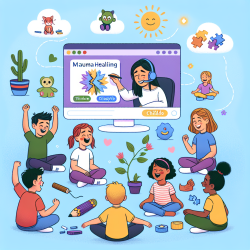As a speech-language pathologist, the impact of trauma on children’s development is an area of significant concern. The recent study, "Manual development and efficacy of Mindful Living Group activities to promote trauma healing during the COVID-19 pandemic in China," offers valuable insights into how mindfulness-based interventions can support trauma healing. Here’s how you can integrate these findings into your practice.
Understanding the Mindful Living Group (MLG) Intervention
The MLG intervention, developed over a decade, combines Eastern mindfulness practices with Western trauma healing theories. This 10-session program includes activities such as mindful breathing, sitting meditation, walking meditation, and deep relaxation, all aimed at reducing depression and anxiety while increasing mindfulness, post-traumatic growth, general self-efficacy, and perceived social support.
Key Findings from the Study
The study involved 31 participants who underwent the MLG intervention online during the COVID-19 pandemic. The results were promising:
- Significant reduction in depression and anxiety: Post-intervention scores for depression and anxiety were markedly lower.
- Increased mindfulness: Participants reported higher levels of mindfulness, which correlated with lower depression and anxiety.
- Enhanced post-traumatic growth: The intervention promoted personal strength, appreciation of life, and improved relationships.
- Improved self-efficacy and social support: Participants felt more capable of handling difficult situations and perceived higher levels of social support.
Applying MLG Activities in Your Practice
To enhance your therapeutic interventions, consider integrating the following MLG activities:
- Mindful Breathing: Encourage children to focus on their breath to help calm their nervous system.
- Sitting Meditation: Use guided meditations to help children achieve a state of relaxation and concentration.
- Walking Meditation: Integrate mindful walking into sessions to help children connect with their body and the present moment.
- Deep Relaxation: Teach children techniques for deep relaxation to help them manage stress and anxiety.
Encouraging Further Research
While the MLG intervention shows great promise, it’s essential to continue researching its application in different contexts and populations. Consider conducting small-scale studies within your practice to evaluate the effectiveness of these activities for the children you work with. Document and share your findings to contribute to the broader understanding of mindfulness-based interventions in speech-language pathology.
For a detailed understanding of the research, read the original research paper.
By incorporating these evidence-based mindfulness practices into your therapeutic interventions, you can support children in their journey towards healing and resilience.










